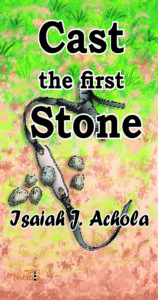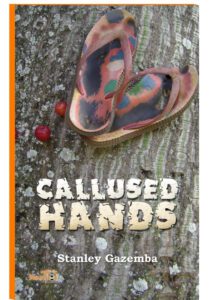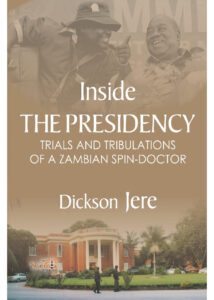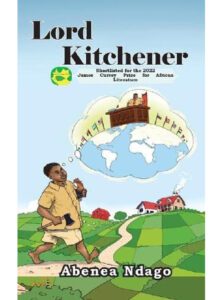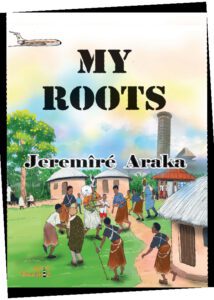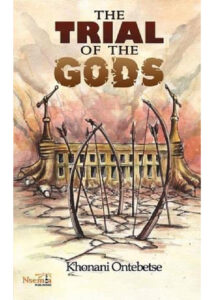
- Title: The Trial of The Gods
- Year: 2011
- Author: Khonani Ontebetse
- Publisher: Nsemia Inc. Publishers, Ontario, Canada
- Reviewed on: September 10, 2011
Reviewed by Bashi Letsididi in Mmegi, Volume 28, #146 of 30 September, 2011. Botswana
By any reckoning, Roy Sesana is an international name-brand human rights super star. Minus a few setbacks, the last couple of years have been mighty good to the First People of the Kalahari leader. He has won the Alternative Novel Peace Prize and was the public face of a successful campaign to have his people return to the sylvan setting of the Central Kalahari Game Reserve (CKGR).
This year, as keynote speaker at the Botswana National Front conference in Tsabong, he became the first CKGR to headline a national meeting of a major political party. Now courtesy of Khonani Ontebetse, a local journalist, Sesana has been immortalized in imaginative literature. The plot is framed around the marathon High Court case in which, to paraphrase a rhyme-inclined wordsmith, the Mosarwa activist showed distinction to prevent the extinction of his people.
In the novel, Sesana gives power and voice to a powerless community locked in an asymmetric battle with a ruthless and arrogant Third World government. The latter looks upon this resistance with strong disfavour and as a result, Sesana and other Basarwa become victims of acts of escalating physical violence, part of a pattern of predation that mostly takes place inside the CKGR.
Through rationalizations and justifications, the government has imputed a false benignity to the forcible removal of the Basarwa from their land its bossy-boot officials spend a shameful amount of time trying to manipulate them in abandoning their ancient lifestyle and acculturating Tswana/Western identity. It matters little to the government that this lifestyle change is neither consistent with the Basarwa’s own aspirations and desire nor that it would erode their centuries old cultural identity.
Of course, there is no mention of Sesana in The Trial of the Gods, but there is absolutely no doubt who Jay Setlhare is in this realist, character-based novel. Nor is there any uncertainty who the other characters are. In real life, Sesana’s right hand and personal interpreter, Jumanda Gakelebone, has a special type of front teeth-rampant pearly whites similar to the ones you see hanging from the open mouth of a champion international marathon runner smiling all the way to the finish line. In the novel’s thinly veiled portrait, Gakelebone is cast as Jamana whose ‘protruding teeth’ the author seems to take great delight referring to constantly.
When the CKGR case came before the Lobatse High Court, the panel of judges was made up of Justices Maruping Dibotelo, Unity Dow and Mphapi Phumaphi. The judge characters are Matlotla Ditiro, Antoinette Brown and Pamani wa Pamani. The State was represented by Sidney Pilane, while Sesana and co-applicants were represented by Gordon Bennett and Duma Boko. Throughout, Ditshwanelo, the local human rights group, took active interest in the CKGR case.
The Trial of the Gods: “My Lords,” said the British lawyer as soon as Judge Ditiro had focused his eyes on him. “My names are Garden Benny.” He paused as the three judges jotted down his names. “I will be representing Jay Setlhare and the other 241 applicants, all former residents of the Central Kalahari Game Reserve or CKGR and accompanying me is the instructing attorney, Dumelang Phoko.”
“I’m Saede Peolwane,” said the State lawyer, getting up. Some 100 pages in, Jay makes the equivalence of a beautiful, light-skinned, bespectacled woman called Lillian from Ditshwanelo Human rights Group who speaks “in the manner of a white woman.” Jay mentally notes that she must have gone to elite private schools and be the daughter of a rich politician. In real life, who might Lillian be? Who? Exactly. That’s her.
This meeting comes at a time of great emotional turmoil for Jay, but what it is worth, the mere sight of Lillian warms the cockles of his heart and he gets all fidgety around her. Far away from Lillian, Jay meets the challenge he is facing with great fortitude and certitude as he barnstorms through First World Capitals to advance his campaign platform. Back home he has to leap over a series of nerve-ending obstacles and crises.
A disruptive presence at public meetings addressed by government officials and in the courtroom itself, Jay is in a wretched mood for most of his waking hours, blithely lobbing loose-cannon, anti-establishment declarations every which way when the urge seizes him.
Under normal circumstances, the opportunity to sink his teeth into the soft and salty joy of fresh eland meat would have reduced him to a Pavlovian dog “but his appetite was not for any kind of food.” So even when Jay’s favourite daughter, Lorato, brings him a plate of this desert delicacy, his salivary glands remain dry.
However, the narration does find its moments of comic gold that provide for both a chuckle and a gleeful peek into Jay’s mind. Recalling a time when he was flown into the CKGR in a helicopter for a court session, Jay tells Jamana that he got completely disoriented and confused.
“Either something went wrong that day or it was the way it was planned,” he says.
There is liberal use of the flash-back technique in the novel, but the literarily literate reader would be disinclined to marvel at its occurrence even in scenes invested with urgency, even when detail that is absolutely essential to the moment is all that is required.
Just when a hunting expedition is about to pounce on two springboks, the narration is inter-cut with a flash-back vignette as a European prince – who has tagged along for the thrill – reminisces about a not terribly eventful episode in the past. This distraction not only slows the down the narrative momentum but also bends the spine of the plot structure out of shape.
Jay’s fortune wax and wane with the back-and-forth of the legal process and wax brightest when the court casts a resounding vote in Basarwa’s favour. While one expects the outcome to deliver joy and happiness to his soul, Jay does not bask in the glory of this moment because by degrees, he comes to realization that he has been pursuing a fool’s errand.
The court victory should have been a first step towards reinvention, but it occurs to him that the mores and folkways of CKGR folk will never be restored to their pure form: the ground on which they were relocated had destroyed them entirely. At a trance dance ceremony days earlier, the prophecy of the medicine man had been dark and apocalyptic: “I foresee more danger. The land will no longer be useful to our people even if we win the case.”
The recurring theme of the trance dance, the Basarwa healing dance that is said to induce spiritual ecstasy, serves as a meta-narrative: that being a narrative within a narrative. The dance is set into the fabric of the community primarily because it embodies the spirit of unity.
In the end, Jamana drops a few not so smart bombs and in the process probably reveals more about himself than he remotely does about the targets he wants to blow to smithereens. He suggests that the intervention of local organizations on their behalf actually amounts to little more than enlightened liberal tribalism. He tells Jay: “After all, aren’t their leaders cattle barons? They want nothing more than seeing us being their herd boys.” He adds that he has realized that Survival International, a British pressure group, has just been using them for its own gain.
“Why didn’t you say so when the campaign started?” Jay asked.
“Because I enjoyed the international trips.”
For Jay, the revelation that his most trusted aide is little more than a commercial performer comes as a severe blow.
By appealing to the better angels of our nature, The Trial of the Gods satisfies the moral purpose of fiction in that it provides a decent platform on which readers can raise their social conscience. It forces them to introspect on the corrosive effects of greed and abuse of power on not only the lives of the victims but also on the minds and souls of the culprits.
In a matter that vividly recalls all the wisdom invested in the saying “what is good for the goose is not good for the gander”, the novel articulates helpful meaning of development and societal progress. It also throws into sharp relief the practical meaning of concepts such as national unity and multiculturalism in situations where there is no equality between social groups and when cultures are different as night and day.
The book’s commanding use of historical facts and context helps the reader rethink the idea of Botswana as the democratic vista it is internationally reputed to be.
However, built into the texture of this narrative format, is an inconvenience that craps the author’s writing style. A fictional re-imagining of Sesana’s epic struggle that, in the main, hews close to what actually happened necessarily limits creative imagination. It dictates that readers well-acquainted with the CKGR saga don’t have to hold their breath for plot twists and suspenseful moments.
At this point, Ontebetse, who is winner of the 2008 Bessie Head Literature Awards, is the only Motswana writer in the Nsemia Inc. Publishers’ stable.
Bashi Letsididi in Mmegi

